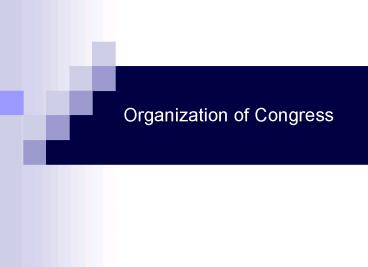Organization of Congress - PowerPoint PPT Presentation
1 / 34
Title: Organization of Congress
1
Organization of Congress
2
Organization of Congress
- Each house may determine the rules of its
proceedings Art. I, Sec. 5, par. 2 - Congress is organized, to a great extent, along
party lines - Four power centers in congress
- Committees
- Caucuses
- Parties
- Leadership
3
Committees
- Committees are perhaps the single most important
institution for the business of congress - Workhorse of congress
- Most bills die in committee
- Headed by chairman
- Standing committees
- Subcommittees
4
Committees
- Three Types of Committees
- Standing
- Select
- Joint
- Conference
5
Committees
- House 21 standing committees
- Each standing committee is divided into
subcommittees
- Senate 18 standing committees
6
Committees
- The most powerful committees are
- Rules (H)
- Appropriations (H S)
- Ways and Means (H)
- Finance (S)
- Armed Services (H S)
- Intelligence (H S)
- Foreign Relations (H S)
- Judiciary (S)
7
Intraparty Committees
- House
- R Committee on Committees
- D Steering Policy Committee
- Senate
- R Committee on Committees
- D Steering Committee
8
Caucuses
- Caucuses have come to rival the parties in
influence
9
Caucuses
- Caucuses are organized around
- Race
- Gender
- Region
- Economic / Industries
- Issues (Ideological)
10
Political Parties
- Congress is dominated by the two major parties
- Majority party (D)
- Minority party (R)
- Jeffords bolts GOP, throws Senate to Dems
11
Party Balance
12
Party Balance
- Democrats generally dominate Congress from 1932-
1994 - Control both houses 1954-94
- 1994, Republicans swept the House and Senate
- Republican Revolution
- Contract w/ America
- Core debate size and scope of government
13
Balance of Power
- Pre 2006 House
- 232 R
- 202 D
- Pre 2006 Senate
- 55 R
- 45 D
14
Party Balance
- CNN Slide Show
15
Balance of Power
- Post 2006 House
- 233 D
- 202 R
- Post 2006 Senate
- 51 D
- 49 R
16
Balance of Power (Current)
Democrats Clean House (Politico)
17
Congressional Leadership
- House
- Speaker (Constitutional)
- Majority Leader
- Majority Whip
- Minority Leader
- Minority Whip
18
Congressional Leadership
- Senate
- Vice president / President Pro tempore
- Majority Leader / Whip
- Minority Leader / Whip
19
Party Organization / Policy Committees
- House
- R House Republican Conference / Policy
Committee - D Democratic Caucus / Policy Committee
- Senate
- R Republican Conference / Republican Policy
Committee - D Democratic Conference / Democratic Policy
Committee
20
Leadership Skills in Congress
- Personal skill is essential for leaders in House
and Senate - Pelosi has been a rising star in the democratic
party, she is the first woman in congressional
history to be Speaker - Johnson was infamous for his persuasive skills as
senate majority leader the so called Johnson
Effect
21
Leadership Skills in Congress
- Newt Gringrich
- Success at unifying the Republicans in 1994
- Stepped down in 98
22
House and Senate Comparison
- House
- Centralized / More Powerful Leaders
- Rules more restrictive and debate is limited
- Get things done
- Senate
- Individualized
- Rules and debate are more open
- Slow and Deliberate
23
The Process Politics of Lawmaking
24
Basic Steps in Lawmaking
- Introduce
- Committee Assignment
- Floor Action
- Presidential Action
25
How a Bill Becomes Law
House
Senate
Introduction (hopper)
Introduction (From floor or as an amendment)
Committee
Committee (Speaker Assigns)
Subcommittee Hearings / Markup
Subcommittee Hearings / Markup
Reported Out
Reported Out
Rules committee House Calendars
Floor Action Debate Voting (Voice, Roll Call,
Teller)
Floor Action Debate Voting (Voice, Roll Call,
Teller)
Conference Committee
President (Signs, Veto, Pocket Veto)
26
How a bill becomes law
- Rules Strategies
- Must pass both houses in one term
- Most bills die in committee
- Discharge petition
- About 6000 bills introduced, only a few hundred
become law - Amendments
- Senate announced from the floor, bypass
committees - Riders are amendments that are not germane
- Christmas Tree bill
- Filibuster used to stall or kill a bill
- Cloture / Rule 22
- Nuclear option (2005)
27
The Politics of Lawmaking
- Process is slow and complex
- Easier to block or kill a bill than to pass it
- Allows outside influence (See Homeland security,
Whodunit) - Omnibus Bills
28
The Politics of Lawmaking
- Congress is Polarized thus to get things done
- Overwhelming public support
- Ex War authorization, Patriot Act, etc.
- Compromise is the art of politics
- Iraq benchmarks v. timetables
- Jockeying for the legislative lead
- Congress v. President
- Democrats v. Republicans
29
Politics of Lawmaking
Pig Book (CAGW)
- Pork Barrel Legislation
30
Case Study the V-22 Osprey
31
Public Perception of Congress
- Voters have a low opinion of Congress
- The current congress (110th, 2006-2008) 22
approval
32
Conflict is Inherent in Congress
- Bicameralism
- Parties / Ideology
- Caucusescompeting interests
- All politics is local politics
- What are the potential benefits of conflict?
- House and Senate stall over budget
33
Finis
34
The Demographic Makeup of Congress































